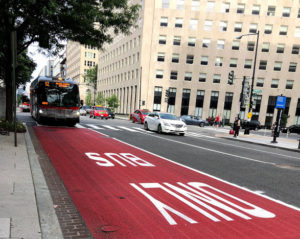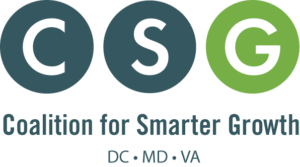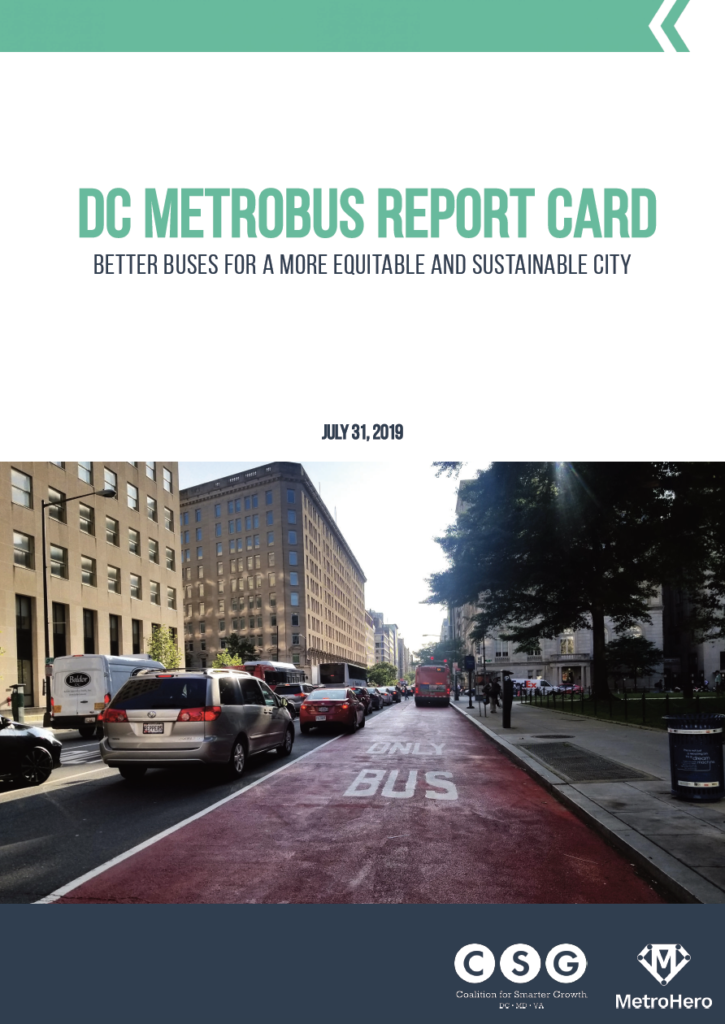Tag: bus report card
CSG in the News: New report card gives Metrobus service in the District a failing grade
CSG in the Washington Post: New report card gives Metrobus service in the District a failing grade
But an analysis says there’s hope for a better bus system if recommendations are carried out.
by Luz Lazo, Washington Post, July 10, 2019
Despite efforts to improve bus service in the District to make it a more attractive option for travel, it continues to be slow and unreliable, with some saying the situation has reached a crisis point.
A report card to be released Wednesday gives Metrobus a grade of D — barely passing.
“Transit is really in crisis,” said Cheryl Cort, policy director at the Coalition for Smarter Growth, which co-sponsored the report along with the MetroHero commute app. “We have been losing riders for quite a few years, and the speed and reliability of the bus just continues to decline.”
Metrobus’s grade was pulled down by some of its biggest — and well-known — problems: buses are commonly stuck in traffic gridlock, they aren’t properly spaced, and they are chronically late.
The good news is the system, which for a long time was an afterthought in a region that prioritizes Metro, is getting some attention….
The report card unveiled Wednesday concurs with the recommendations by the [Metro-led Bus Transformation] transportation project. Among them are making boarding easier through mobile or offboard payment systems; enhancing affordable options with free transfers between bus and rail and reduced-fare passes for low-income riders; and improving the rider experience with efficient next-bus technology, modern fleets, clear system maps, and safe and accessible bus stops….
The District this summer launched the H and I street NW bus lanes, aimed at speeding travel of about 70 buses an hour in the downtown corridors. Hill said that though the bus lanes are only a pilot, she hopes they will be made permanent. The District is also moving toward construction of a long-planned bus lane on 16th Street NW and a transitway in the congested K Street corridor, which carries a bulk of the routes servicing downtown.
“This is the right direction. These are the things D.C. should be doing,” she [co-author Jennifer Hill] said.
[Poll: Majority of Washington-area residents support bus-only lanes.]
Jeff Marootian, director of the District Department of Transportation, said the recent investments in the downtown bus lanes, along with the other bus priority plans, will make buses more attractive to riders and are part of the city’s strategy to decrease congestion and make the District’s transportation more sustainable.
Read the full Washington Post story here.
RELEASE: DC Bus Service gets a “D” on its Report Card
Press Release
FOR IMMEDIATE RELEASE
July 10, 2019
CONTACT
Cheryl Cort, Coalition for Smarter Growth
202-675-0016
cheryl@smartergrowth.net
DC Bus Service gets a “D” on its Report Card
Groups highlight how DC buses can be faster and more reliable
D.C. – Today, Coalition for Smarter Growth and MetroHero released a first-ever performance-based DC Bus Report Card. Developed from real-time data collected in May 2019 by MetroHero, the report shows DC’s major bus routes suffer from poor reliability and sluggish speeds, factors that are likely major contributors to the system’s declining ridership. The analysis of the report card can be found here.
“Our analysis shows the challenges Metrobus riders encounter on a daily basis. On the city’s priority corridors with high-ridership routes, we found service to be generally unreliable and unpredictable, with speeds slower than 10 mph,” said Jennifer Hill, Ph.D., Lead Researcher at MetroHero.
“The slow speeds and lack of on-time reliability are contributing factors in declining ridership. But we know how to turn this around: give buses priority on the streets, speed up boarding, balance bus stop spacing, and provide customer-focused service,” said Cheryl Cort, Policy Director for the Coalition for Smarter Growth.
MetroHero analyzed bus performance for 34 routes in DC’s highest ridership corridors in May 2019, focusing on three key factors: adherence to designated headways, adherence to scheduled arrival times, and average travel speed. Bus speeds on these routes averaged just 9.5 mph over the entire month, confirming other data showing that Metrobus speeds across the entire system have been getting slower every year.
“We hope that this report will be a useful tool to inform decision-makers about where DC’s buses need the most help and what solutions will have the greatest impact for riders,” said Hill.
DC and Metro are stepping up to implement improvements to bus service. DC recently implemented pilot bus lanes on H and I Streets downtown, and is planning to run bus lanes on 16th Street and K Street in the near future. The city has also implemented traffic signal priority and queue jumps on several corridors.
On an average weekday, Metrobuses transport over 200,000 riders around the District of Columbia to and from work, school, doctor appointments, grocery stores, entertainment, and more. Buses offer transit service far beyond the reach of Metrorail.
“This is an important moment for DC’s bus service. Buses are the most efficient use of limited public street space for moving people, and critical if the city is to grow without choking on traffic. We are encouraged by recent city actions, but urge the Bowser administration to make moving buses truly a top priority on our city’s streets,” said Cort.
About the Coalition for Smarter Growth
The Coalition for Smarter Growth is the leading organization in the Washington DC region dedicated to making the case for smart growth. Our mission is to promote walkable, inclusive, and transit-oriented communities, and the land use and transportation policies and investments needed to make those communities flourish. Learn more at smartergrowth.net.
About MetroHero
MetroHero (www.dcmetrohero.com), which began as a simple app designed to visualize real-time train positions in the D.C. Metrorail system, has been monitoring and providing performance metrics on WMATA’s trains for over three years. The app has gained popularity with many area commuters, averaging roughly 15,000 unique users every month, largely due to its unique real-time visualizations of the current state of the Metrorail system, from train delays and service outages to user-driven reports of inconveniences such as station crowding and broken intercoms. In September 2018, the MetroHero team extended a number of their train performance tracking algorithms to the Metrobus system, which they used to gather performance data for the report card.
###
Making DC’s Buses the Best: A forum on the first performance-based D.C. Bus Report Card and next steps for faster, more reliable bus service for all.
Join us for the release of the first D.C. Bus Report Card. A short presentation will be followed by an interactive discussion with leading decision-makers, transit experts, and advocates sharing ideas on how to make D.C.’s bus system the best way to travel on city streets.
WHEN: July 10, 2019, 6:30-8:30 pm
WHERE: Georgetown University’s Downtown Campus, 640 Massachusetts Ave NW, Washington, D.C.
There is no charge to attend this event, but pre-registration is required.
Representatives from the Coalition for Smarter Growth and Metro Hero will present the results of the first ever performance- based report card for D.C. buses and a panel of local experts will discuss how this assessment ties in with other studies being done to improve the bus. The panel will include Councilmember Mary Cheh, DDOT Director Jeff Marootian, and representatives from WMATA, TransitCenter, and the Greater Washington Partnership. Uwe Brandes, of the Georgetown Urban & Regional Planning Program will moderate.
based report card for D.C. buses and a panel of local experts will discuss how this assessment ties in with other studies being done to improve the bus. The panel will include Councilmember Mary Cheh, DDOT Director Jeff Marootian, and representatives from WMATA, TransitCenter, and the Greater Washington Partnership. Uwe Brandes, of the Georgetown Urban & Regional Planning Program will moderate.
Join us on July 10 to learn about new ideas and next steps to improve bus service in the District and hear updates on current projects at DC Department of Transportation and Metro! Through this discussion, we hope to inspire public involvement and support for the best possible bus service in the District of Columbia and the National Capital Region.
Co-hosted by: Coalition for Smarter Growth, MetroHero and Georgetown SCS Urban & Regional Planning Program
photo credit: Cheryl Cort
CSG partnering with MetroHero on “Report card” to determine if D.C. Metrobus service makes the grade
“Report card” will determine if D.C. Metrobus service makes the grade
May 9, 2019 — The Coalition for Smarter Growth (CSG) is partnering with MetroHero to release a report card on Metrobus service in D.C. The report card will grade bus service on speed and reliability.
The MetroHero team will be monitoring activity on 34 major bus routes in D.C.’s priority corridor network throughout the month of May, evaluating each route based on metrics such as average travel speed, spacing between buses, and how closely the buses keep to their scheduled arrival times. The results will be publicized in a digital “report card” which will assign grades to each of the routes based on their performance in each of these different areas, inspired by a similar project by the Bus Turnaround Coalition in New York City. The resulting analysis will form the basis of a public report written by CSG and MetroHero that will identify the greatest problems faced by D.C.’s priority bus routes today and make recommendations for how to improve their performance in the future.
The reports will be made available to the public in June.
MetroHero (www.dcmetrohero.com), which began as a simple app designed to visualize real-time train positions in the D.C. Metrorail system, has been monitoring and providing performance metrics on WMATA’s trains for over three years. The app has gained popularity with many area commuters, averaging roughly 15,000 unique users every month, largely due to its unique real-time visualizations of the current state of the Metrorail system, from train delays and service outages to user-driven reports of inconveniences such as station crowding and broken intercoms. In September 2018, the MetroHero team extended a number of their train performance tracking algorithms to the Metrobus system, which will be used to gather performance data for the report card.
 CSG (www.smartergrowth.net) is the leading organization in the Washington, D.C. region dedicated to making the case for smart growth — promoting walkable, inclusive, and transit-oriented communities, and the land use and transportation policies to make those communities flourish. In 2017 and 2018, CSG organized non-profits and partnered with the business community in the MetroNow campaign to win $500 million per year in dedicated funding for Metro. CSG serves on the Bus Transformation Study executive committee, previously led and won an 81-mile bus rapid transit plan for Montgomery County, Maryland, and has led other campaigns for improved transit.
CSG (www.smartergrowth.net) is the leading organization in the Washington, D.C. region dedicated to making the case for smart growth — promoting walkable, inclusive, and transit-oriented communities, and the land use and transportation policies to make those communities flourish. In 2017 and 2018, CSG organized non-profits and partnered with the business community in the MetroNow campaign to win $500 million per year in dedicated funding for Metro. CSG serves on the Bus Transformation Study executive committee, previously led and won an 81-mile bus rapid transit plan for Montgomery County, Maryland, and has led other campaigns for improved transit.

